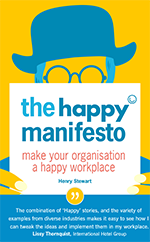Work Less Hours, And Get More Done!
On the one hand we learned last week that Goldman Sachs view of work/life balance was to tell their interns to leave the office at midnight and take Saturdays off, limiting the working week to a mere 102 hours.
A very different approach is being taken by Gothenberg City Council, in Sweden. In a new experiment, they have asked half their care staff to work 6 hour days instead of 8 hours to see if they get as much done.
There are examples out there that suggest less time can be more productive:
Hi, we are Happy
We are leading a movement to create happy, empowered and productive workplaces.
How can we help you and your people to find joy in at least 80% of your work?

Goodman Masson, London: Its Friday, its 3.30 – go home
Goodman Masson is a financial recruitment agency, based in London. A couple of summers ago they decided to stop work at 3.30 on Fridays, enabling staff to enjoy the weather and start the weekend early.
“I analysed all the data”, explains CEO Guy Hayward “and it had no effect on the level of sales. We track the phone time of our consultants and this actually went up, as did morale. So we extended it throughout the year. At 3.30pm every Friday I send round an email telling people to go home.”
Toyota, Sweden: 6 hours shifts are more productive than 8 hours
Toyota’s assembly line in Gothenberg has switched from 8 hour shifts to 6 hours. Martin Banck explained the approach at Woohoo‘s happiness conference in Copenhagen earlier this month. (If your Swedish is good, check out his talk).
There was no fall in production and the change led to happier staff, happier customers and more profits. With both shifts able to be fitted into a daytime, costs fell. Martin did display a slide on the disadvantages of the shorter day. The slide was blank.
Google: Leave your laptop at the office
Although a great place to work, Google has a notoriously long-hours culture. However even at Google, there are attempts to get people to work less and avoid burn out. In Work Rules, Laszlo Bock explains how Google Dublin introduced “Dublin goes dark”, encouraging people to leave at 6pm, and providing drop-off locations for laptops, to prevent people working in the evening at home.
He quotes People Operations leader Helen Tynan: “Lots of people chatted the next day about what they had done, and how long the evening had seemed with lots of times for doing things.” The idea spread from the People dept to the whole of Google Dublin and has now gone international.
Judge people on results not hours
The approach promoted by ROWE (Results only Work Environment) is that employees should be judged on their results and not on the time they spend in the office. Advocate range from the Girl Scouts of San Gorgino tot he retailer Gap. It certainly makes sense to me.
At Happy we have always sought to avoid a long hours culture. It is rarely productive and we want our customers to meet people who are fresh, relaxed and happy. We expect people to work hard (and work whenever it suits them) but if they are working beyond their 38 hour week, we will work with them to reduce it.
Time to cut those hours?
The results of the Gothenberg city council experiment will be interesting. A Swedish friend tells me that this is only one of a range of Swedish organisations, in the public and private sector, exploring shorter working weeks.
Do you still have a long hours work culture? Or do you have a great example, like Goodman Masson or Toyota Gothenberg, of getting more done in less time. If you do, please share it int he comments below.
Keep informed about happy workplaces
Sign up to Henry's monthly Happy Manifesto newsletter, full of tips and inspiration to help you to create a happy, engaged workplace.

Learn the 10 core principles to create a happy and productive workplace in Henry Stewart's book, The Happy Manifesto.
Henry's Most Popular Blogs
- 8 Companies That Celebrate Mistakes
- 9 Benefits of Having Happy Employees
- 321Zero: How I Solved my Email Overload
- 16 Companies That Don't Have Managers
- 5 Big Companies Who Swear by Mindfulness
- 49 Steps to a Happy Workplace
- A Four Day Week? Let's Start With a Four Day August
- Google: Hire Great People and Give Them Lots of Autonomy
- Buurtzorg: No Managers, Just Great Care From a Nurse-Led Service
- 30 Steps to Joy at Work: Get More Done by Being Less Busy

Henry Stewart, Founder and Chief Happiness Officer
Henry is founder and Chief Happiness Officer of Happy Ltd, originally set up as Happy Computers in 1987. Inspired by Ricardo Semler’s book Maverick, he has built a company which has won multiple awards for some of the best customer service in the country and being one of the UK’s best places to work.
Henry was listed in the Guru Radar of the Thinkers 50 list of the most influential management thinkers in the world. "He is one of the thinkers who we believe will shape the future of business," explained list compiler Stuart Crainer.
His first book, Relax, was published in 2009. His second book, the Happy Manifesto, was published in 2013 and was short-listed for Business Book of the Year.
You can find Henry on LinkedIn and follow @happyhenry on Twitter.
Next Conference: 2025 Happy Workplaces Conference
Our Happy Workplaces Conference is our biggest event of the year, and we'd love for you to join us on Thursday 12th June!
This year's event will be held at Happy's HQ in Aldgate, central London.
We may also offer a hybrid option for people to join us online simultaneously — do let us know if you are interested in joining online and we can add you to the waiting list.
As always, our next conference will be filled with interaction, discussion and space for reflection.
Related courses
The Happy Leadership Programme
Brave Leadership: One-Year Leadership Development Programme for Women
Level 7 Senior Leadership Apprenticeship Programme
Not what you need? Take a look at all of our off-the-shelf Leadership and Management programmes.